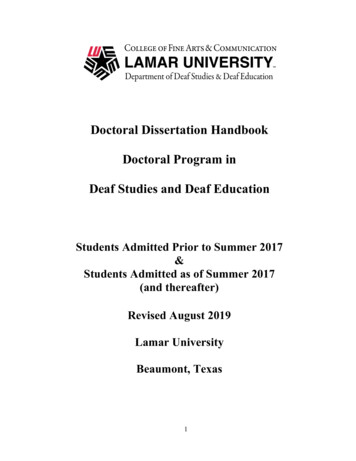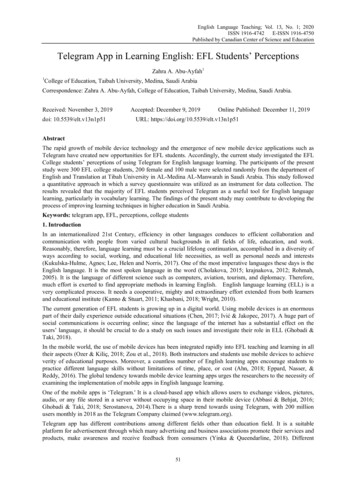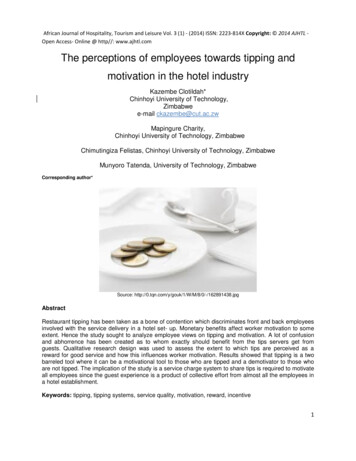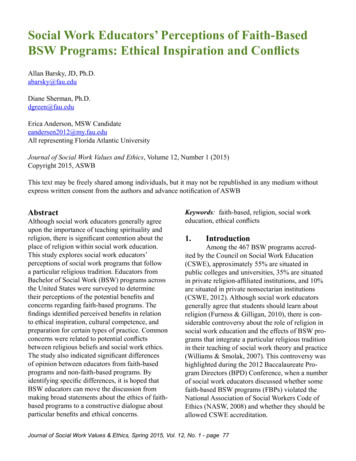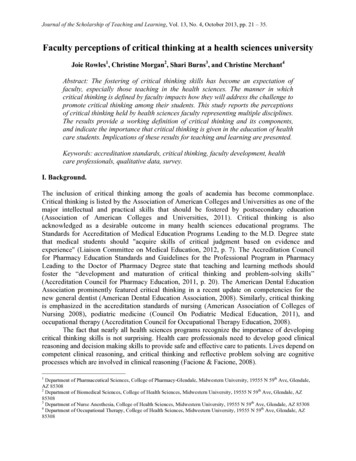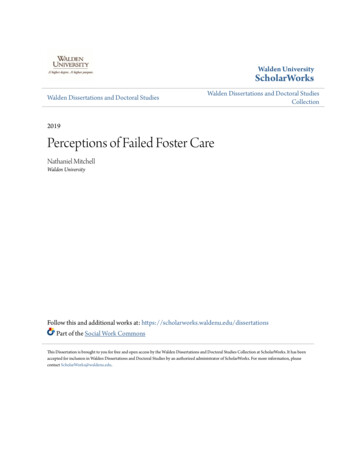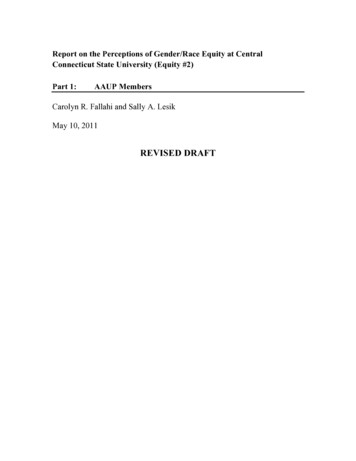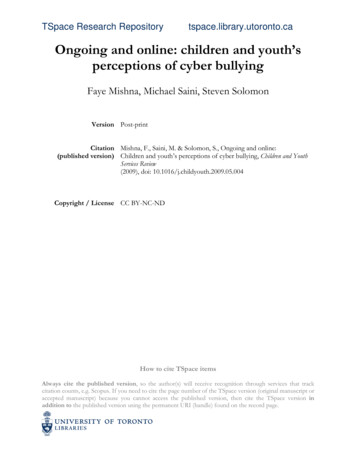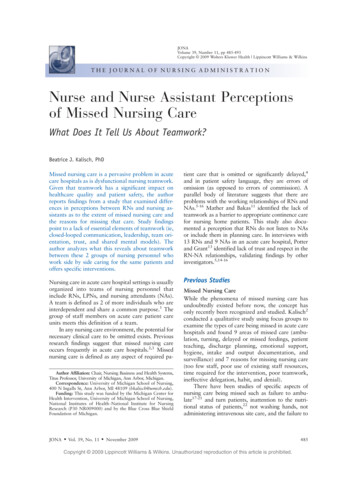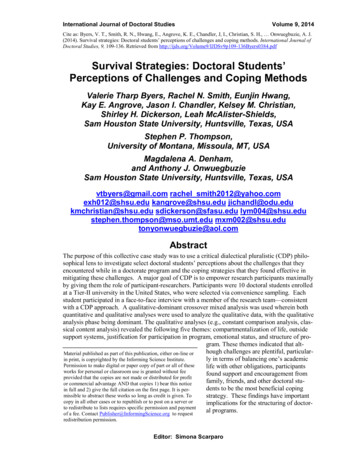
Transcription
International Journal of Doctoral StudiesVolume 9, 2014Cite as: Byers, V. T., Smith, R. N., Hwang, E., Angrove, K. E., Chandler, J, I., Christian, S. H., Onwuegbuzie, A. J.(2014). Survival strategies: Doctoral students’ perceptions of challenges and coping methods. International Journal ofDoctoral Studies, 9, 109-136. Retrieved from fSurvival Strategies: Doctoral Students’Perceptions of Challenges and Coping MethodsValerie Tharp Byers, Rachel N. Smith, Eunjin Hwang,Kay E. Angrove, Jason I. Chandler, Kelsey M. Christian,Shirley H. Dickerson, Leah McAlister-Shields,Sam Houston State University, Huntsville, Texas, USAStephen P. Thompson,University of Montana, Missoula, MT, USAMagdalena A. Denham,and Anthony J. OnwuegbuzieSam Houston State University, Huntsville, Texas, USAvtbyers@gmail.com rachel smith2012@yahoo.comexh012@shsu.edu kangrove@shsu.edu jichandl@odu.edukmchristian@shsu.edu sdickerson@sfasu.edu lym004@shsu.edustephen.thompson@mso.umt.edu mxm002@shsu.edutonyonwuegbuzie@aol.comAbstractThe purpose of this collective case study was to use a critical dialectical pluralistic (CDP) philosophical lens to investigate select doctoral students’ perceptions about the challenges that theyencountered while in a doctorate program and the coping strategies that they found effective inmitigating these challenges. A major goal of CDP is to empower research participants maximallyby giving them the role of participant-researchers. Participants were 10 doctoral students enrolledat a Tier-II university in the United States, who were selected via convenience sampling. Eachstudent participated in a face-to-face interview with a member of the research team—consistentwith a CDP approach. A qualitative-dominant crossover mixed analysis was used wherein bothquantitative and qualitative analyses were used to analyze the qualitative data, with the qualitativeanalysis phase being dominant. The qualitative analyses (e.g., constant comparison analysis, classical content analysis) revealed the following five themes: compartmentalization of life, outsidesupport systems, justification for participation in program, emotional status, and structure of program. These themes indicated that although challenges are plentiful, particularMaterial published as part of this publication, either on-line orly in terms of balancing one’s academicin print, is copyrighted by the Informing Science Institute.Permission to make digital or paper copy of part or all of theselife with other obligations, participantsworks for personal or classroom use is granted without feefound support and encouragement fromprovided that the copies are not made or distributed for profitfamily, friends, and other doctoral stuor commercial advantage AND that copies 1) bear this noticedents to be the most beneficial copingin full and 2) give the full citation on the first page. It is permissible to abstract these works so long as credit is given. Tostrategy. These findings have importantcopy in all other cases or to republish or to post on a server orimplications for the structuring of doctorto redistribute to lists requires specific permission and paymental programs.of a fee. Contact Publisher@InformingScience.org to requestredistribution permission.Editor: Simona Scarparo
Survival StrategiesKeywords: doctoral student, challenges, coping, doctoral students’ perspectives, doctoral programsIntroductionBy design, earning a doctorate degree is not a quick or easy process; otherwise, the educationalvalue of the graduate school’s terminal degree would be diminished. As noted by M. Jones(2013), attrition rates for doctoral students range from 33% to 70% (cf. Gardner & Gopaul, 2012;Ivankova & Stick, 2007; Jiranek, 2010; Kim & Otts, 2010). Further, a 2008 study conducted bythe Council of Graduate Schools (CGS; Sowell, 2008) revealed that only 57% of doctoral students completed their degree programs within 10 years. The researchers in this CGS study examined 330 doctoral programs representing various disciplines over a 12-year period (Sowell, 2008).In a separate study of attrition rates at the doctoral level, Lovitts (2001) found that attrition ratescan range from 30% to 50% depending on field of study, consistent with the CGS findings (Sowell, 2008). These and other studies (cf. M. Jones, 2013) provide evidence that time managementand persistence have been challenges to success at the doctoral level. There are other obstacles toovercome as well. The first-year experience is a daunting one for doctoral students because manyhave to become re-acclimated to the learning environment after years in the workplace, in addition to adapting to the rigors of a doctoral research program (Wao & Onwuegbuzie, 2011; Witte& James, 1998). Numerous factors have been identified that can hinder a student’s doctoral experience, such as financial and resource issues, difficult disciplines, accessibility of information,and progress monitoring (Neumann, 2012; Wao & Onwuegbuzie, 2011), as well as isolation (Ali& Kohun, 2006, 2007; Kohun & Ali, 2005; Lovitts, 2001).The first-year doctoral experience often leads to students questioning whether they made the correct decision to pursue a doctorate degree (Witte & James, 1998), leading to high attrition rates atthis early stage of these students’ doctoral programs (Jairam & Kahl Jr., 2012; Lott, Gardner, &Powers, 2010). Indeed, as noted by Ali and Kohun (2006), in the first year of their doctoral programs, students experience difficulties in adjusting to their new life of doctoral studies. Moreover, typically, the first year of the doctoral program yields the most difficult adjustment (Hockey,1994). This adjustment likely is even more difficult for first-generation doctoral students (Gardner & Holley, 2011; Holley & Gardner, 2012). Beeler (1991) identified four stages wherein theactual adjustment occurs for new graduate students: unconscious incompetence (i.e., occurringupon entering the doctoral program wherein students have a limited idea about what is involvedin the program either academically or socially), conscious incompetence (i.e., occurring after thestudents gain knowledge about the academic requirements during which time they become awareof their academic deficits), unconscious competence (i.e., occurs when students believe that theyhave acquired some competence in their fields of study but are mostly unaware of their competence, thereby leading them to feel competent unconsciously), and conscious competence (i.e.,occurs when students have accumulated sufficient knowledge that they become aware of whatthey know). According to Beeler (1991), this adjustment process places a psychological burdenthat overwhelms some students. And students who are unable to cope with this psychologicaladjustment might fall behind relative to other students in their program, which might lead to themdropping out of the program. With the vast differences in attrition rates of doctoral students being 33% to 70% (cf. Gardner & Gopaul, 2012; Ivankova & Stick, 2007; Jiranek, 2010; Kim &Otts, 2010), researchers, through this collective case study, sought to determine the common experiences of select doctoral students and what motivated their persistence through their doctoraldegree programs.No matter the rigor of the doctoral program, research has indicated that peripheral factors canhave just as much impact on the attrition of doctoral programs as can the difficulty of the coursework. Factors from marital discord to financial burdens to the relationship with the student’s ad-110
Byers et al.visor all can have significantly detrimental effects on educational success at the doctoral level(Maher, Ford, & Thompson, 2004). Students who contend with family issues during their doctoral programs often experience “considerable additional duress” (Maher et al., 2004, p. 388). Maher et al. (2004) noted that women are most often distracted from their academic endeavors bytheir maternal responsibilities, the emotional toll of a divorce or death, and the financial securityassociated with success. These diversions, more often than not, lead doctoral students to exhibitconcerns regarding stress, time strain, one’s emotional and psychological well-being, and lack ofsupport from family members and friends (Moyer, Salovey, & Casey-Cannon, 1999).Pyhältö, Toom, Stubb, and Lonka (2012) investigated the problems confronted by doctoral candidates during their doctoral programs and their well-being with respect to their studying engagement. Participants involved 669 doctoral students from the Faculties of Arts, Medicine, and Behavioural Sciences, who were administered a survey. Pyhältö et al. (2012) documented that thedoctoral students’ perceptions of the problems that they experienced during their studies varied.In particular, these problems were related to general working processes (31%), domain-specificexpertise (29%), supervision and the scholarly community (21%), and resources (19%). Nearlyone half (i.e., 43%) of the study participants had contemplated withdrawing from their studies.Further, the doctoral students’ well-being varied as a function of whether they had at some pointin their studies considered withdrawing from their studies, with those students who had considered withdrawing from their studies reporting more anxiety, higher levels of stress, lower levelsof interest in their studies, and more exhaustion than did students who had not considered withdrawing from their studies.Even with these challenges, the number of doctorates awarded each year in the United States hasan average annual growth of 3.4%, demonstrating an upward trend over time (National ScienceFoundation, National Center for Science and Engineering Statistics [NSF, NCSES], 2012). Thepersistence and determination of students’ progression through their doctoral studies are highlycorrelated with students’ motives for seeking such a degree (Geraniou, 2010). Morton andThornley (2001) acknowledged two common motives for pursuing a doctoral degree among bothmale and female students: that of an individual’s interest in the subject matter and that of an individual’s personal satisfaction of pursing a graduate degree. Similarly, Leonard, Becker, andCoate (2005) concluded that most students acknowledged personal development (e.g., increasedconfidence, self-fulfillment) and development of research skills (e.g., becoming more reflectiveand analytic, improving writing ability) as being the motivating factors leading to the determination of completing a doctoral degree while overcoming adversities. Furthermore, emotional support from family members often is cited as “critical to those in the throes of the doctoral process,providing them with the encouragement needed to persist and succeed” (Maher et al., 2004, p.388).Although several quantitative research studies in the area of graduate student stress and copinghave been conducted (El-Ghoroury, Galper, Sawaqdeh, & Bufka, 2012; Holahan, 1979; Mechanic, 1962), there is a lack of in-depth qualitative research on the subject in the field of education.At the time Mechanic’s (1962) study was conducted, few social psychologists and virtually nosociologists had conducted studies about stress (Glassner, 1979). Mechanic’s (1962) study involved 23 sociology graduate students preparing for their doctoral examinations and focused onthe psychological stress and coping strategies. Unlike the present study, the participants in Mechanic’s (1962) study were not part of a cohort structure, but rather were in a competitive environment. A principle revelation from Mechanic’s (1962) study was that a student’s reaction tostress depended on the resources or coping mechanisms that the student possessed and where theywere in the social network. Mechanic (1978) argued that “The ability to cope with the environment depends on the efficacy of the solutions to which one has been exposed” (pp. x-xi).111
Survival StrategiesMechanic's (1962, 1978) study on stress in graduate students involved a relatively small sampleof participants from a single department, whereas Holahan’s (1979) study expanded the samplesize as well as emotional stress as an interactive function of department type and personal needfor support. Holahan’s (1979) study involved 377 female graduate students from various disciplines, divided into three groups based on the representation of female students in their departments. The hypothesis of the study was that the environments would be less supportive in disciplines that were considered nontraditional for females, thereby displaying the strongest relationship between stress and need for support among this group. The findings from Holahan’s (1979)study suggested that females in minority departments (i.e., nontraditional for females) showed thestrongest relationship between stress and the need for support.The most recent, randomized, and comprehensive study was conducted by El-Ghoroury et al.(2012). Underwritten by the American Psychology Association (APA), the randomized surveystudy conducted by El-Ghoroury et al. (2012) assessed a national sample of 387 students in awide range of psychology fields to examine stressors, coping strategies, and barriers that interfered with their optimal functioning. The study comprised students at the graduate level of whom54% were doctoral students. Univariate and multivariate tests were conducted and the resultsrevealed that 70.5% respondents experienced stress related mostly to (a) academic responsibilitiesand pressures, (b) finances or debt, (c) anxiety, and (d) poor work/school life balance. The majorcoping strategies discerned were (a) friends’ support, (b) family support, (c) talking to a classmate, (d) regular exercise, and (e) hobbies. Moreover, major barriers to coping were reported tostem from lack of time and financial constraints. El-Ghoroury et al. (2012) purported that theirquantitative research study was the first simultaneously to measure stress, coping strategies, andbarriers to coping among graduate students. However, they also noted that the design did not allow for specific and individualized matching of stressors, coping, and barriers to coping. Moreover, the sample consisted of graduate master-level and doctoral-level students from a variety ofpsychology disciplines. The authors admitted that stressors such as financial burdens differedamong students at different stages of their graduate journeys. Therefore, the present qualitativeresearch study sought to assess specific and individual challenges and coping mechanisms amongselected doctoral students only. Indeed, even though El-Ghoroury et al. (2012) listed social support from friends, family, and classmates as a most frequent strategy used by graduate psychologystudents to manage stress, it is unclear whether similar strategies applied to doctoral students ineducation. Collegial actions, that is, seeking friends’ support (74.4%) and talking to a classmate(62.8%), were cited as the predominant stress coping mechanisms by the majority of respondentsin El-Ghouroury et al.’s (2012) research study.Ultimately, the purpose of the current qualitative research study was to explore the experiences ofa select group of doctoral students, namely, students representing a whole cohort. Specifically,we investigated their challenges and coping strategies that these cohort members utilized to overcome their challenges in the doctoral program. We hoped to share the common experiences of acohort of doctoral students in terms of their challenges and coping strategies, assuming that manydoctoral students face common challenges in completing their doctoral degrees regardless of thefield of study or other factors (e.g., gender, age). Furthermore, it was hoped that the knowledgefrom this study could help administrators of doctoral students, advisors/supervisors, and mentorsto understand factors that contribute to the attrition and retention of doctoral students by identifying possible challenges and coping strategies that can be utilized to overcome the challenges, respectively.This study was framed within a critical dialectical pluralism philosophical lens (Onwuegbuzie &Frels, 2013). According to Onwuegbuzie and Frels (2013), a major goal of critical dialecticalpluralism is to empower research participants maximally by giving them the role of participantresearchers. As such, all participants in this qualitative research study served as research partici-112
Byers et al.pants, who maintained an active role at every stage of the research process. It was hoped thatfindings from this collective case study would increase our understanding of how these doctoralstudents perceived these issues, thereby yielding insights into their particular educational, social,and familial processes and practices.Qualitative Research QuestionsThe following qualitative research questions were addressed in this study:1. What types of challenges do select doctoral students face during their participation in a doctoral program?2. What do select doctoral students perceive as being characteristics of effective coping strategieswhen facing challenges associated with their doctoral programs?Methodological FrameworkThe methodological framework for this study was based on Leech and Onwuegbuzie’s (2013) 13step qualitative research process, illustrated in Figure 1.Following the 13-step qualitative research process allowed the participant-researchers to conducta study and to write a report that was both warranted (i.e., provided adequate evidence to justifythe results and conclusions) and transparent (i.e., makes “explicit the logic of inquiry and activities that led from the development of the initial interest, topic, problem, or research question;through the definition, collection, and analysis of data or empirical evidence; to the articulatedoutcomes of the study” )—as specified in the seminal document developed by the Task Force onReporting of Research Methods in American Educational Research Association (AERA) Publications entitled Standards for Reporting on Empirical Social Science Research in AERA Publications (AERA, 2006, p. 2).MethodParticipantsAs posited by Miles and Huberman (1994), qualitative research often involves small samples ofpeople nested in context, with a tendency to be purposively selected. To obtain our sample, weutilized a convenience sampling method consisting of the two selection criteria that were basedon the following elements: (a) participant selection into a higher education administration doctoral program and (b) particular enrollment in a doctoral qualitative research methodology course.Ten participants met the criterion used to generate the sample. Each of the participants was asecond-year higher education doctoral student, enrolled in a qualitative research methodologycourse at a public university in Southeast Texas. This course was conducted concurrently at asatellite campus of the university by use of Interactive Television (ITV). ITV classes weretransmitted live over the university’s video network and allowed students and instructors to interact between classrooms through automated zoom cameras and microphones located on podiumsand desks in each of the two classrooms. Students in each classroom viewed their linked counterparts via large television screens and data projectors. Participants were evenly split betweenthe two locations based on their location preference.113
Survival StrategiesFigure 1. Qualitative methodological framework guiding the inquiry.Adapted from Leech & Onwuegbuzie, 2013114
Byers et al.At the time the study was conducted, all participants resided in Texas. In addition, each of theparticipants had experience in a higher education setting. Participant roles ranged from facultymembers to higher education executives. Further, all participants had obtained master’s degreesbefore beginning the doctoral program. With regard to race and e
The first-year doctoral experience often leads to students questioning whether they made the cor-rect decision to pursue a doctorate degree (Witte & James, 1998), leading to high attrition rates at this early stage of these students’ doctoral programs (Jairam
